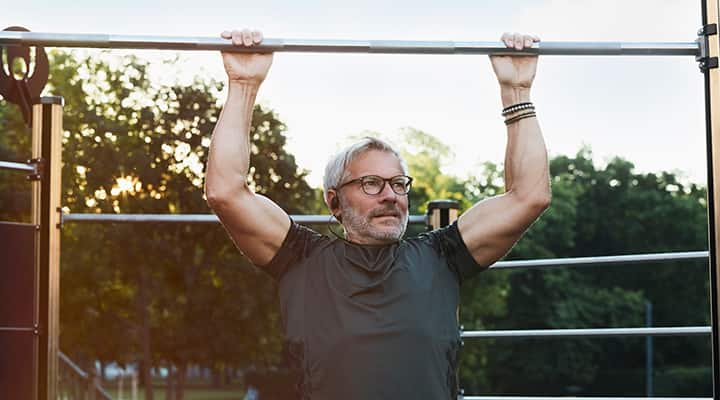
How to Naturally Increase Testosterone?
Published: November 2021 | Updated: November 2022
Usually by the age of 30, testosterone levels start falling by about 1% per year, which is correlated with increased body fat, low libido, depressed mood, low energy and reduced concentration and memory.
How much testosterone should a man have? Our recommended ranges for total testosterone and free testosterone are 600-900 ng/dL and 15-25 pg/mL, respectively. You can take a male hormone test to see where you fall—and if you are lower than optimal, there are a variety of male hormone restoration strategies that will boost your testosterone levels and can alleviate symptoms related to low testosterone.
Here are our recommendations for reclaiming the testosterone levels of your youth—naturally.
DO: Boost testosterone with exercise

When men think of raising their testosterone, they might first think of exercise or sometimes specifically, bodybuilding. Testosterone benefits fitness in two ways: it can increase your energy levels, which may increase your exercise capacity, and it contributes to muscle building. And the relationship between testosterone and exercise is a two-way street: getting in enough activity supports how much testosterone you have.
However, not all exercises have an equal effect on men at all ages. A meta-analysis of 22 clinical trials that measured the effects of testosterone and different types of exercise on men aged 60 and above showed that aerobic training and high-intensity interval training increased testosterone. Surprisingly, weightlifting did not improve testosterone levels.
This doesn't mean that older men should stop resistance training; this type of exercise is excellent for overall health, strength and metabolism. However, for men with low testosterone, exercise alone will most likely not suffice to raise basal testosterone to healthy ranges.
DO: Eat a testosterone-friendly diet

What you eat can have a significant impact on your testosterone levels—which means getting in the right amount protein. Notice we say "the right amount" and not "the maximum." Many people might think that foods high in protein are the most important for testosterone levels. But more is not always better; your protein intake should depend on how much exercise you get. Research shows that not getting enough protein when exercising may decrease testosterone, but also getting too much protein with too little exercise can a negative impact on your testosterone.
It's not just protein that you have to watch out for if you're worried about testosterone levels: diets low in healthy fats can decrease testosterone levels, too. Fatty fruits like avocados, on the other hand, are rich in healthy fats in addition to a multitude of healthy nutrients.
Foods high in both fats and protein such as salmon make great options. As an added benefit, salmon is also high in vitamin D3, zinc, and omega 3s, which may also help boost testosterone production. Eggs are another great option as they are packed with healthy fat, protein, and selenium; increasing data suggests that selenium is important for the biosynthesis of testosterone.
DO: Keep your cholesterol in check
Good news: eating those healthy fats (and following the Mediterranean diet, in general) helps maintain healthy cholesterol levels…which, as it turns out, has an impact on your testosterone, too. Wondering what the relationship is between cholesterol and testosterone? Cholesterol is needed for the creation of pregnenolone, which is also called the "mother hormone" because all hormones are descendants of pregnenolone.
High cholesterol is associated with low hormones levels like testosterone. Why? Because elevated cholesterol may not readily convert pregnenolone to produce all the other hormones, testosterone included. Getting a handle on your cholesterol can help increase testosterone, and by that same token, bringing testosterone to healthier levels may also provide the added benefit of reducing cholesterol.
DON'T: Skimp on vitamin D
Do vitamin deficiencies affect testosterone levels? The most important deficiency to worry about in relationship to testosterone is vitamin D deficiency.
In a clinical trial of men with low testosterone, 3,332 IU's of vitamin D3 daily for 1 year resulted in average rise of total testosterone levels and free testosterone levels. Total testosterone levels were still below optimal—meaning that vitamin D isn't a "magic bullet" for low testosterone. However, having healthy levels of the sunshine vitamin is linked with many other benefits, from sturdy bones to a strong immune system—and fortunately, there are easy ways to boost your vitamin D levels quickly.
DO: Explore natural compounds that support healthy testosterone
Saw palmetto, zinc and chrysin all have been suggested to improve testosterone levels, and more recent data has found stronger clinical benefits from pomegranate and cacao extracts. In a clinical study, scientists gave pomegranate extract to healthy men for 2 weeks and testosterone levels rose by an average of 24%. In another clinical trial, a blend of pomegranate and cacao extracts resulted in a 48% increase in free testosterone after 8 weeks.
Other recent data suggests that luteolin, an extract from plants such as Japanese sophora, provides multiple benefits related to testosterone health—including increasing the conversion of cholesterol into pregnenolone. In addition, luteolin activates StAR protein expression, which contributes to increased cholesterol entry into the mitochondria in turn leading to higher testosterone levels.
DO: Limit alcohol intake and avoid drugs
Heavy alcohol intake can have negative effects on testosterone production. Aside from testosterone production, there are a myriad of other reasons to avoid heavy alcohol consumption.
Narcotics like oxycontin reduce the release of luteinizing hormone, a hormone that stimulates the production of testosterone.
DON'T: Let stress take over your life

Some studies show that men in stressful life circumstances are more likely to have lower levels of total testosterone compared to those in less stressful situations. This is because increased cortisol (the stress hormone) may have some relationship with testosterone production.
Natural ways to reduce cortisol include extracts from the bark of magnolia and phellondendron trees and lychee-green tea blend. One of the most popular herbal extracts is from ashwagandha. In a clinical trial, 60 days of ashwagandha not only reduced cortisol with parrel reductions in stress and anxiety, but it also increased testosterone levels in males.
DON'T: Skimp on sleep
Sleep is when our bodies replenish their hormones. In fact, research shows that most of the daily testosterone release in men occurs during sleep. It's practically scientific consensus that adults should be getting 7-9 hours of sleep a day, but what happens to male testosterone production if they get less?
Some studies show less sleep can mean reduced testosterone—others are less definitive. Regardless, we should be striving to achieve the recommended amount of sleep, to benefit our brain, stress levels, immune health and more.
DO: Maintain a healthy weight
Obesity is associated with decreased testosterone levels in males. This is mostly because fat cells, which are called adipocytes, express high levels of an enzyme called aromatase, which converts testosterone into estrogen.
Research shows that rapid weight loss with successful weight maintenance can bring about a sustained increase in free testosterone levels.
Do men need estrogen?
With all of this talk about testosterone, what about estrogen? Some estrogen is important to both men and women, but when it's too high, that can be associated with increased disease risk. In fact, even only slightly elevated estrogen levels are associated with double the risk of stroke and significantly increases incidence of coronary artery disease.
We recommend that men stay within a range for estradiol (the estrogen derivative measured in blood) of between 20-40 pg/mL. Speak with your doctor about taking aromatase inhibitors if your estrogen levels are above this range.
DO: Check your testosterone levels regularly
Your testosterone levels fluctuate significantly from morning to evening, and of course, can change yearly. If you're just starting on a testosterone boosting intervention, such as testosterone gel or a nutraceutical, then you will need to check your hormone status more regularly to track your progress. Once levels are maintained then they should be monitored ideally once a year.
Life Extension offers multiple blood testing panels that include free and total testosterone testing. Speak with a Wellness Specialist to figure out which option is right of you.
References
- Abbott, Kylie et al. "Dietary supplementation with docosahexaenoic acid rich fish oil increases circulating levels of testosterone in overweight and obese men." Prostaglandins Leukot Essent Fatty Acids, December 2020, https://pubmed.ncbi.nlm.nih.gov/33221700/
- Al-Dujaili, Emad et al. "Pomegranate juice intake enhances salivary testosterone levels and improves mood and well being in healthy men and women." Society for Endocrinology, 2012, https://www.endocrine-abstracts.org/ea/0028/ea0028p313
- Alemany, Joseph A. "Effects of dietary protein content on IGF-I, testosterone, and body composition during 8 days of severe energy deficit and arduous physical activity." J Appl Physiol, May 2008, https://pubmed.ncbi.nlm.nih.gov/18450989/
- Brownlee, Kaye K et al. "Relationship between circulating cortisol and testosterone: influence of physical exercise." Journal Sports Sci Med., March 2005, https://pubmed.ncbi.nlm.nih.gov/24431964/
- Chung, Tae-Ha et al. "High triglyceride to HDL cholesterol ratio is associated with low testosterone and sex hormone-binding globulin levels in Middle-aged and elderly men." Aging Male, June 2020, https://pubmed.ncbi.nlm.nih.gov/30270690/
- Couture, Roxanne et al. "Luteolin modulates gene expression related to steroidogenesis, apoptosis, and stress response in rat LC540 tumor Leydig cells." Cell Biol Toxicol., February 2020, https://pubmed.ncbi.nlm.nih.gov/31201582/
- D'Andrea, S et al. "Relationship of Vitamin D status with testosterone levels: a systematic review and meta-analysis." Endocrine, April 2021, https://pubmed.ncbi.nlm.nih.gov/32880851/
- Fronczak, Carolyn M et al. "The insults of illicit drug use on male fertility." J Androl., July 2012, https://pubmed.ncbi.nlm.nih.gov/21799144/
- Hayes LD et al. "Short-Term Exercise Training Inconsistently Influences Basal Testosterone in Older Men: A Systematic Review and Meta-Analysis." Front Physiol., January 2019, https://pubmed.ncbi.nlm.nih.gov/30692929/
- Hosseini Balam, Farinaz et al. "Inhibitory effect of chrysin on estrogen biosynthesis by suppression of enzyme aromatase (CYP19): A systematic review." Heliyon, March 2020, https://www.ncbi.nlm.nih.gov/labs/pmc/articles/PMC7063143/
- Jankowska, Ewa A et al. "Reduction in circulating testosterone relates to exercise capacity in men with chronic heart failure." J Card Fail., June 2009, https://pubmed.ncbi.nlm.nih.gov/19477405/
- Kumagai H et al. "Increased physical activity has a greater effect than reduced energy intake on lifestyle modification-induced increases in testosterone." J Clin Biochem Nutr., January 2016, https://pubmed.ncbi.nlm.nih.gov/26798202/
- Longcope C et al. "Diet and sex hormone-binding globulin." J Clin Endocrinol Metab., January 2000, https://pubmed.ncbi.nlm.nih.gov/10634401/
- Lopresti AL et al. "An investigation into the stress-relieving and pharmacological actions of an ashwagandha (Withania somnifera) extract: A randomized, double-blind, placebo-controlled study." Medicine (Baltimore)., September 2019, https://pubmed.ncbi.nlm.nih.gov/31517876/
- Lu, D. et al. "Inhibitory Effect of Luteolin on Estrogen Biosynthesis in Human Ovarian Granulosa Cells by Suppression of Aromatase (CYP19)." J Agric Food Chem., August 2012, https://pubmed.ncbi.nlm.nih.gov/22838964/
- Pilz S et al. "Effect of vitamin D supplementation on testosterone levels in men." Horm Metab Res., March 2011, https://pubmed.ncbi.nlm.nih.gov/21154195/
- Sansone, Andrea et al. "Smoke, alcohol and drug addiction and male fertility." Reproductive Biol Endocrinol., January 2018, https://pubmed.ncbi.nlm.nih.gov/29334961/
- Schwanbeck SR et al. "Effects of Training With Free Weights Versus Machines on Muscle Mass, Strength, Free Testosterone, and Free Cortisol Levels." J Strength Cond Res., July 2020, https://pubmed.ncbi.nlm.nih.gov/32358310/
- Thirumalai, Arthi et al. "An update on testosterone, HDL and cardiovascular risk in men." Clin Lipidol, November 2015, https://www.ncbi.nlm.nih.gov/labs/pmc/articles/PMC4527564/
- Vingren JL et al. "Testosterone physiology in resistance exercise and training: the up-stream regulatory elements." Sports Med., December 2010, https://pubmed.ncbi.nlm.nih.gov/21058750/
- Whittaker J et al. "Low-fat diets and testosterone in men: Systematic review and meta-analysis of intervention studies." J Steroid Biochem Mol Biol., June 2021, https://pubmed.ncbi.nlm.nih.gov/33741447/
- Wittert, Gary. "The relationship between sleep disorders and testosterone in men." Asian J Androl., March 2014, https://www.ncbi.nlm.nih.gov/labs/pmc/articles/PMC3955336/
Always be in the know!
Access the latest deals, wellness news, expert health tips & more!



